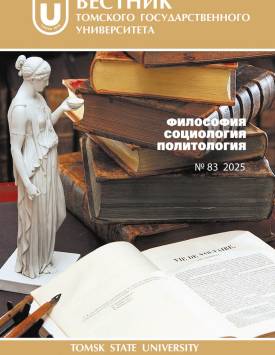“Cancel culture” and “corporate cancellation” in the discourse of social philosophy
The question is raised about the need to develop a scientific definition of the term “cancel culture” and to overcome the practices of its use in academic discourse as a metaphor and “turn of speech”. It is assumed that the basis of cancellation is the exclusion of an individual, a social group or a sacred being from the present or past processes of social exchange. The abolition that has existed since ancient times in the conditions of postindustrial civil society, the rule of law, the development of mass media and means of communication has turned into a culture of abolition, not accidentally arising in the “West”. The political, economic, and socio-psychological features of modernizing societies have determined the specifics of corporate cancellation, the mechanism of which is fundamentally different from the implementation of cancel culture. which is characterized by the decisive role of not all parties interested in the abolition, but only one with monopoly powers to redistribute the resources of society, usually on behalf of some sacred being or “imaginary community” (the abolition itself is often justified by the interests of the latter, but even in the case of changes in the constructs of the past, it is closely related to modern socio-political relations). On the example of attempts to cancel the feature film Mikulai (2023), the article identifies different types of cancellation and traces their relationship with the socio-political organization of society and its symbolic (primarily ethnohistorical) models. Thus, the Mikulai case reflects the mechanisms of two types of cancellation, the peculiar intertwining of which is apparently due to the modernization of mutual influences in different spheres of society. Corporate cancellation was the leading one, since the very possibility of the film's emergence was determined by the desire to convey to the mass audience the idea of the dangers associated with the threat to the historical unity of ethnonation, which, in turn, itself personifies the vertical of the corporate structure of society. The gradual cessation of the film's distribution and mentions of it is outside the framework of cancel culture because the influence of outraged viewers on everything that was happening was minimal, and, given the earlier free screening of performances based on the play Mikulai, the regional media simply would not have paid attention to them. The presented material indicates the need for further work on the methodological support of the concept "cancel culture”, taking into account all the features of its use in academic discourse and higher education. The authors declare no conflicts of interests.
Keywords
Mikulai,
Kryashens,
ethnonationalism,
corporate cancellation,
cancel culture,
cancellationAuthors
| Ovchinnikov Alexander V. | Tomsk State University; Kazan State Power Engineering University | ovchinnikov8_831@mail.ru |
| Anikin Daniil A. | Tomsk State University; Saratov State University | dandee@list.ru |
Всего: 2
References
Рахимбай И. "Я понимал, что мы либо все передвигаем, либо газуем как рок-н-ролльщики // Информационное агенство "Реальное Время". URL: https://realnoevremya.ru.turbopages.org/realnoevremya.ru/s/articles/237511-na-etno-triller-s-viktorom-suhorukovym-miku-lay-sobirayut-dengi (дата обращения: 1.11.2024).
Мирошниченко М.И., Журавлева В.А. "Бывшие люди": структура и особенности нормативно-правового статуса // Гуманитарно-педагогические исследования. 2021. Т. 5, № 3. С. 2736.
"Мы заранее говорили, что будет скандал": почему кряшены Татарстана хотят запретить "Микулая"? // БИЗНЕС Online: деловая электронная газета. URL: https://www.business-gazeta.ru/article/609020 (дата обращения: 1.11.2024).
Шарафиев Э.И. Общественное и культурное развитие кряшен Республики Татарстан в 1989-2010 гг.: дис. канд. ист. наук. Казань, 2022. 288 с.
Филиппова Т. "Крестьяне бывают разные".. Образ кулака в раннесоветской сатире // Официальный сайт Российского исторического общества. URL: https://historyrussia.org/sobytiya/krestyane-byvayut-raznye-obraz-kulaka-v-rannesovetskoj-satire.html (дата обращения: 1.11.2024).
Шарипова А.С. Художественное осмысление темы судьбы человека и нации в монодраме Мансура Гилязова "Микулай" // Филологические науки. Вопросы теории и практики Philology. Theory & Practice. 2022. Т. 15, вып. 3. С. 693-697.
Овчинников А.В. "Микулай" открывает глаза: могут ли отменить фильм? URL: https://m.realnoevremya.ru/articles/293458-mikulaya-smogut-otmenit-mikulay-otkryvaet-glaza (дата обращения: 1.11.2024).
Гилязов М.А. Микулай: монопьеса в двух действиях (действие I). URL: https://tuganaylar.ru/news/literaturnye-proizvedeniya/mikulay-monopesa-v-dvukh-deystviyakh-deystvie-i (дата обращения: 1.11.2024).
История и культура татар-кряшен (XVI-XX вв.) / отв. ред. Р.Р. Исхаков; Ин-т истории им. Ш. Марджани АН РТ. Казань: Ин-т истории им. Ш. Марджани АН РТ, 2017. 959 с.
Головашина О.В. Репрезентация идентичности: почему не каждую традицию можно изобрести? // Вестник Томского государственного университета. 2023. № 495. С. 62-70.
Становление и генезис кряшенской идентичности / под ред. Р.Р. Исхакова. Казань: Ин-т истории им. Ш. Марджани АН РТ, 2022. 240 с.
Овчинников А.В. "Корпоративная отмена": приключения "мифа 922 года" между академическим и идеологическим дискурсами // Galactica Media: Journal of Media Studies. 2024. Т. 6, № 1. С. 202-224.
Тишков В.А., Шнирельман В.А. Как и зачем надо изучать национализм // Национализм в мировой истории. М.: Наука, 2007. С. 4-35.
Поланьи К. Великая трансформация. М.: Изд. дом ГУ ВШЭ, 2006. 406 с.
Линченко А.А. Формы исторического забвения и фигуры умолчания в коммеморативных практиках движения Black Lives Matter: сравнительный анализ медиадискурсов в англоязычных странах // Galactica Media: Journal of Media Studies. 2024. Т. 6, № 1. С. 225-243.
Суриков И.Е. Институт остракизма в Античной Греции: к общей оценке феномена // История и современность. 2005. № 2. С. 113-130.
Мосс М. Общества. Обмен. Личность: труды по социальной антропологии. М.: Книжный дом - Университет (КДУ), 2011. 413 с.
Салинз М. Экономика каменного века. М.: Объединенное гуманит. изд-во, 1999. 293 с.
Хоманс Дж. Возвращение к человеку // Американская социологическая мысль: тексты. М.: Изд-во МГУ, 1994. С. 46-61.
Сыров В.Н. К вопросу о философских основаниях "культуры отмены" и ее значении для осмысления и отношения к прошлому // Вестник Томского государственного университета. 2023. № 492. С. 85-90.
Сыров В.Н. "Культура отмены": к вопросу о критериях определения и правомерности применения // Антиномии. 2024. Т. 24, вып. 3. С. 7-22.

